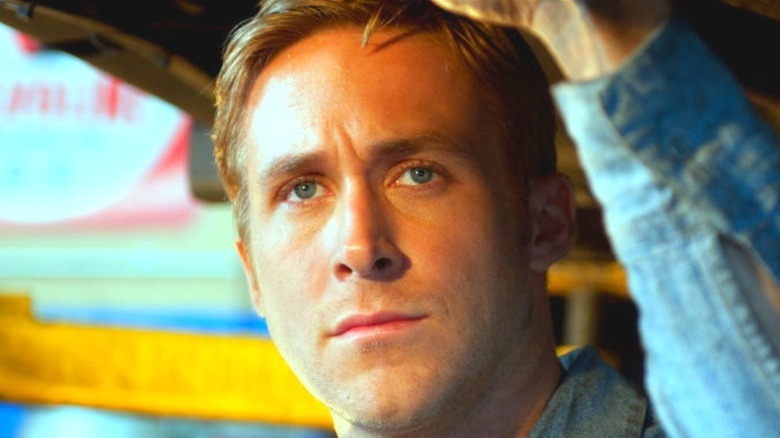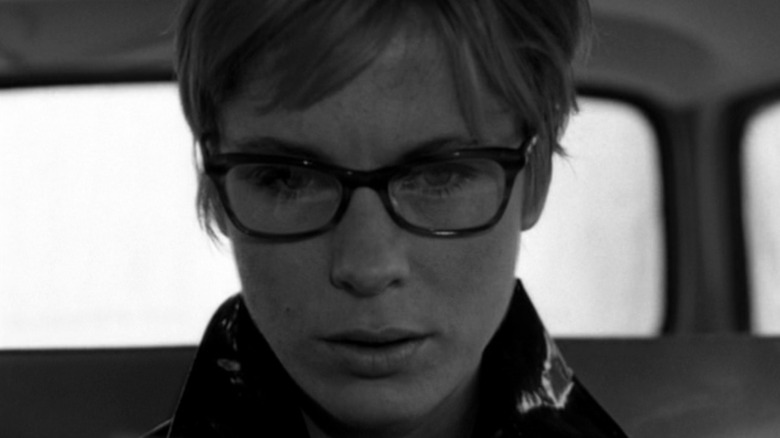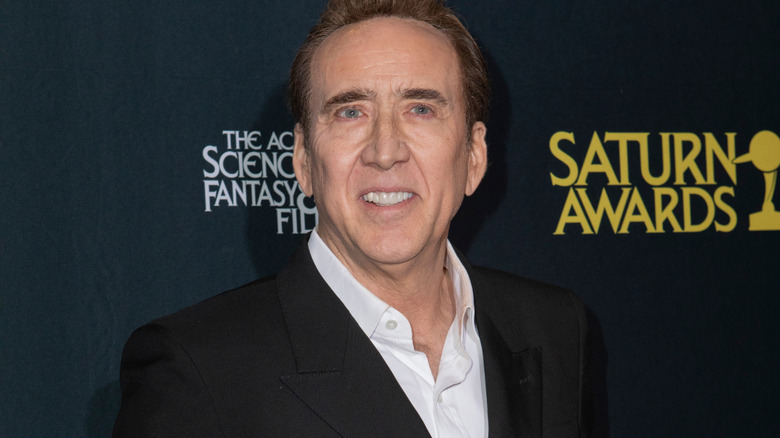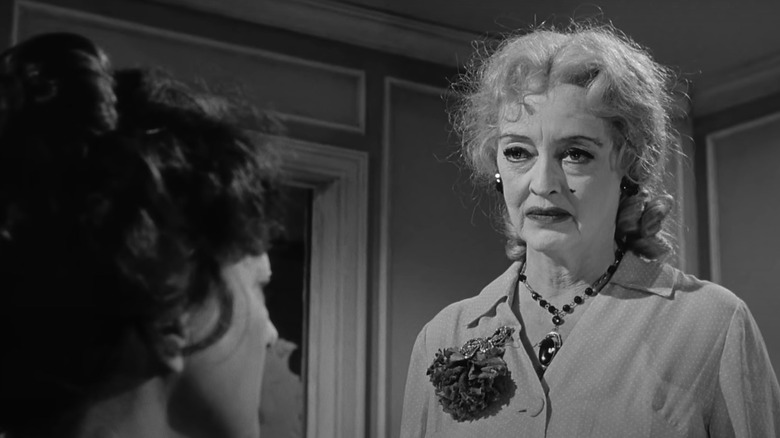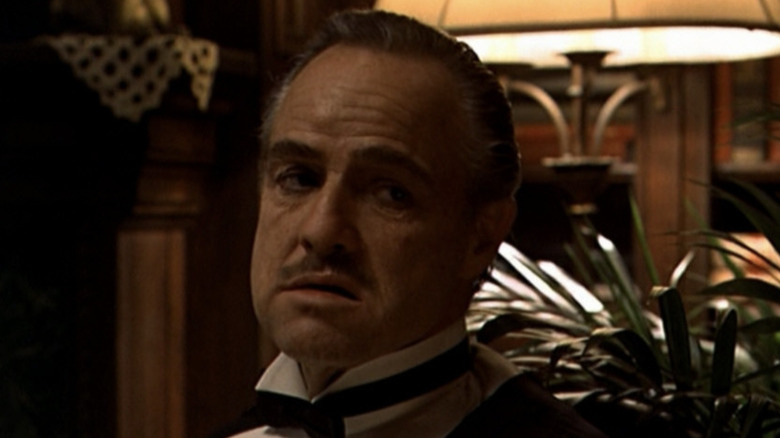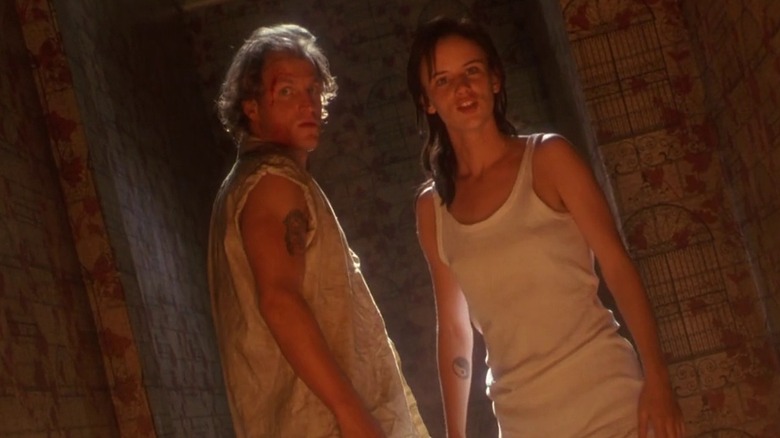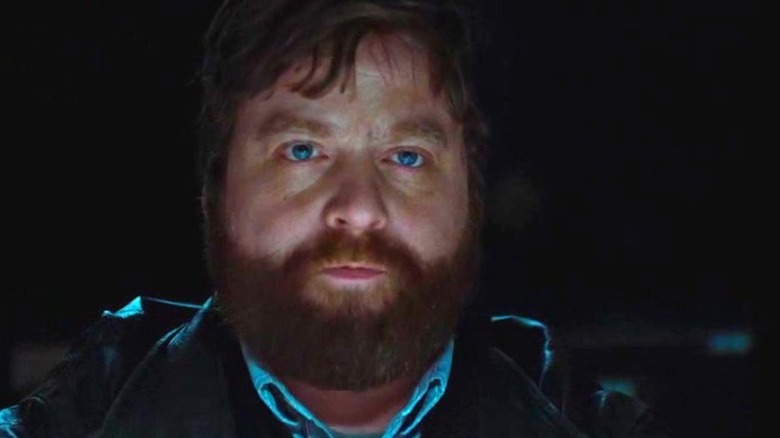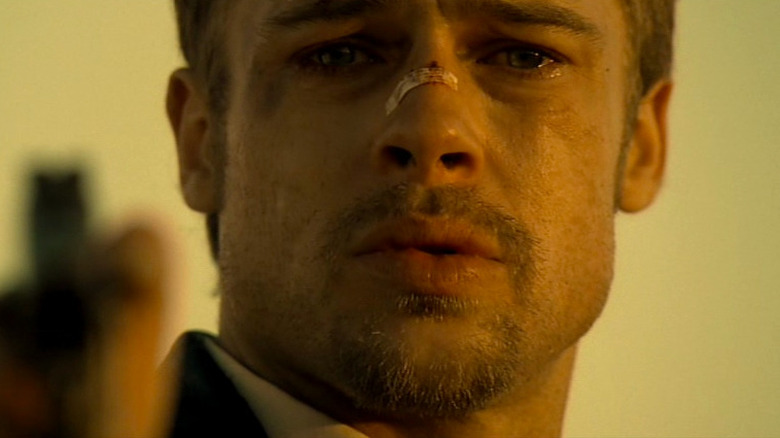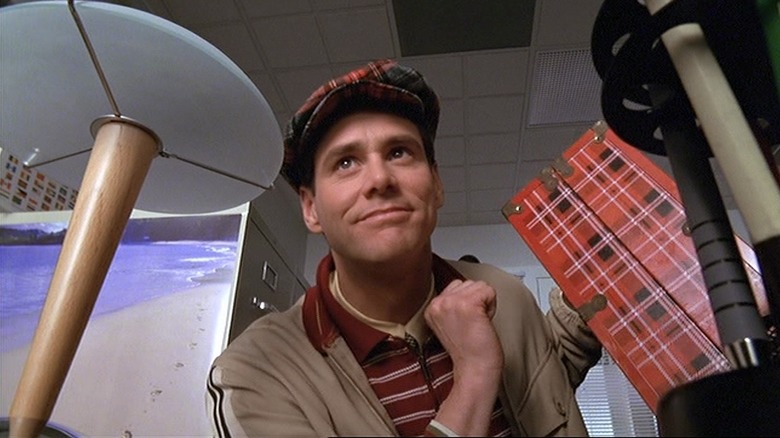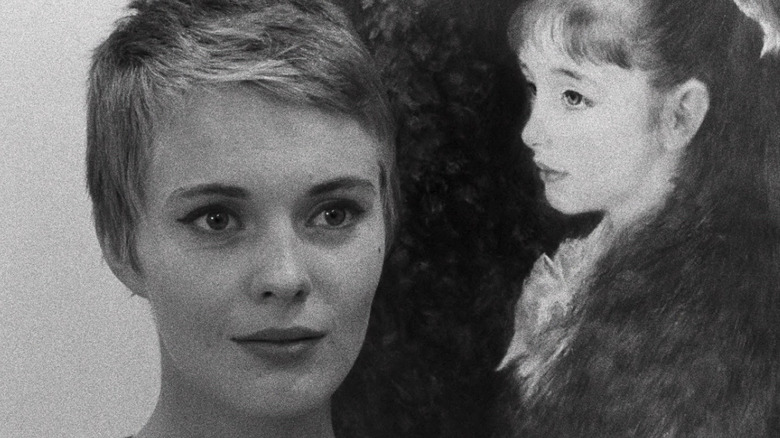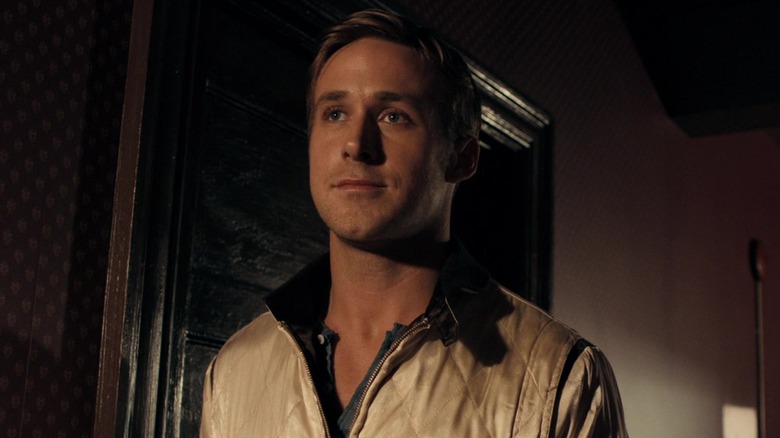The Most Bizarre Reasons Actors Took A Movie Role
What makes an actor decide which roles to take? Of course, Hollywood newcomers snag what they can get, hoping to finally receive their big break. But once an actor is more established, they can be more selective, as they might be able to turn something down due to scheduling conflicts or because it doesn't align with what they want. On the flip side, some stars get offered a part simply because of who they are.
As "Arrowsmith" star Helen Hayes once declared, "Roles aren't being fitted to the actors anymore; the actors are being fitted to the roles." (via The New York Times). In her 20s, Hayes found herself typecast and became obsessed with trying to stay away from the cute and charming characters she was known for and for many actors, playing against type is exactly why they take on a role.
Sometimes, however, a celeb will agree to a role because they made a genuine mistake. Bill Murray, who famously starred in the critically panned "Garfield" in 2004, told GQ that he took the part because of a complete misunderstanding. He saw that Joel Coen wrote the script and jumped at the opportunity to work with the Coen Brothers ... only to realize after the fact that the writer was Joel Cohen, one of the writers for the original "Toy Story."
Fumbles aside, the following stars signed onto various movies due to unconventional motives, ranging from the tragic to downright hilarious. These are the bizarre reasons actors took on a movie role.
Warning: some spoilers below.
Bibi Andersson's character in Persona revealed a surprising truth about herself
Bibi Andersson was a muse of the celebrated filmmaker Ingmar Bergman, as she appeared in a total of 10 Bergman films, such as "The Seventh Seal," "Wild Strawberries," and "Persona." While the public praised her work in all three of those films, it's the latter that stands out, as Andersson carries the bulk of the dialogue in the flick.
For an inexplicable reason, the stage actor Elizabeth (Liv Ullmann) has gone mute. The nurse Alma (Andersson) has been enlisted to take care of her and takes her to a beach cottage to recover. Alma, who initially seems more headstrong, suddenly starts fusing her personality with her patient and she unravels and grows afraid, while the once-sorrowful Elizabeth slowly returns to her old self.
"Persona" was released in 1966, while Andersson was still in her early 30s. As she revealed to The New York Times in 1977, she spent her 20s fighting for her independence, so the role of Alma surprised the young star. Up until then, Bergman had put her "in uncomplicated roles, symbolizing simple, girlish things" to the point that people called her "a professional innocent."
She elaborated on this to American Film Magazine in 1977, noting that she "wasn't flattered" by the role when she first read the script (via The Guardian). "I didn't understand why I had to play this sort of insecure, weak personality when I was struggling so hard to be sure of myself and to cover up my insecurities." Ultimately, she explained, Bergman was trying to capitalize on her real-life insecurities to make the part more believable and she took on this challenge to better know herself.
Nicolas Cage took on various movie roles to pay off his debts
Nicolas Cage has had an absolute roller coaster of a career. The nephew of famed filmmaker Francis Ford Coppola has starred in what seems like countless movie roles – and for a good reason, too. According to CNBC, the "Mandy" star was once worth a whopping $150 million, yet saw his funds dwindle after making repeated outrageous purchases, such as shrunken pygmy heads, a "Superman" comic worth $150,000, a nine-foot-tall burial tomb, an octopus, and a dinosaur skull that was 70 million years old (which he later had to give back to the Mongolian government).
However, it wasn't Cage's love for the bizarre that saw him squander away his hard-earned dollars; according to the actor, it was his ever-growing real estate portfolio, which once saw Cage owning 15 different properties around the world. "You're not going to go into dire straits buying an octopus," Cage matter-of-factly told The New York Times in 2019. Instead, he began buying real estate in what he dubbed a "holy grail quest" — to find places that aligned with the mythology books he was reading.
Regardless of the reason, Cage suddenly found himself in significant debt. Per GQ, he spent a decade taking on as many movie roles as he could to pay them off (46, to be exact), dubbing the experience "a conveyor belt." By late 2020, he claims to have finally paid everything off.
Bette Davis agreed to star opposite Joan Crawford only if she got the lead
Joan Crawford and Bette Davis' feud is the stuff of Hollywood lore. According to Harper's Bazaar, the four-decade-long feud started in the early 1930s, when Davis was still early in her career and was promised newspaper headlines dedicated to her breakout role in "Ex-Lady." However, Crawford — already an established actor — was going through a divorce, and her tabloid gossip overshadowed Davis' success.
From there, the women fought over roles, Academy Awards, and men. Finally, in 1962, Davis and Crawford — who were well after their Hollywood prime — were asked to star together in the classic psychological horror film "What Ever Happened To Baby Jane?"
"Baby" Jane Hudson (Davis) is a vaudeville actress whose star faded with the rise of the talkies. Her shy sister Blanche (Crawford) found success in Hollywood, but her career was cut short by a car accident that left her paralyzed. Now, the two sisters are trapped in their house together, as Jane resentfully takes care of Blanche, who's unwittingly dragged into her sister's delusions of grandeur.
As detailed in "Not the Girl Next Door," Crawford actually approached Davis about the part, much to Davis' surprise. Davis decided to meet with director Robert Aldrich and sign on for the flick under two conditions: "I only needed to know I was Baby Jane and that [Aldrich] was not involved with Miss Crawford" because she "didn't want him favoring her with more close-ups."
"What Ever Happened To Baby Jane?" was an absolute hit, with Davis snagging an Oscar nomination for best actress in a leading role — much to Crawford's disdain (via Harper's Bazaar).
Marlon Brando did The Godfather after making this promise to his secretary
Francis Ford Coppola's "The Godfather" is one of the best gangster movies of all time. One of the many reasons it was so successful was Marlon Brando's role as Vito Corleone, the aging family patriarch, who enlists his youngest son Michael (Al Pacino) to take over the family business.
As it turned out, getting Brando to star in the now-iconic part proved challenging from the get-go. According to Vanity Fair, Brando — who was in his late-40s — was viewed as a Hollywood has-been for almost a decade. His age was the least of his problems though; his on-set behavior left filmmakers frustrated, while his movies themselves were box office duds. Brando's personal life was also in shambles, as he was going through his third divorce, was addicted to Valium, and was crippled by debt.
It was Mario Puzo, the author of the novel that the film was based on, who championed the actor. Puzo wrote a letter to Brando about the part, which fell into the hands of the star's secretary, Alice Marchak. Brando wasn't interested in working at all but Marchak saw that he needed a job for psychological and financial reasons. She finally struck a deal with him: He promised he would only take one Valium a day and decided to sign on for three films (via Vanity Fair).
Brando continued to brush off the role of Corleone, however, because he didn't want "to glorify the Mafia." So, Marchak finally delivered the nail in the coffin: She played into Brando's jealous nature by telling him that Laurence Olivier was testing for the part. "Laurence Olivier! He can't play a Mafia don!," Brando declared, and just like that, he pushed Coppola for a screen test.
If you or anyone you know needs help with addiction issues, help is available. Visit the Substance Abuse and Mental Health Services Administration website or contact SAMHSA's National Helpline at 1-800-662-HELP (4357).
Juliette Lewis did Natural Born Killers as her nihilistic rite of passage
When Oliver Stone's "Natural Born Killers" was released in 1994, it was met with a flurry of negative reviews. Even worse, the violent road-trip drama incited real-life killings that allegedly inspired it, which caused some A-listers like author John Grisham to speak out against the flick (via Entertainment Weekly). Yet that disturbing content matter of "Natural Born Killers" is exactly what spoke to its leading star, Juliette Lewis.
The film revolves around Mickey (Woody Harrelson) and Mallory (Lewis), two criminal lovers with troubled pasts, who go on a murder spree throughout America. They become glorified by the press, which results in a horrific public obsession with the duo.
For Lewis, it's the controversial nature of the script that first attracted her to it. Speaking to Entertainment Weekly in 2019, she elaborated that the screenplay "was multi-layered, and so it was exciting, because it had risky elements in the subversiveness of it." Lewis was 19 when she filmed "Natural Born Killers" and she felt that the movie allowed her to bask in her "primal energies," which she wasn't really allowed to showcase as a woman.
While this was still relatively early on in her career, Lewis was already pivoting away from "safer" roles, choosing to star in feature films with darker content matter like "Cape Fear" and "What's Eating Gilbert Grape." As she further explained to Entertainment Weekly, she was "going through my nihilistic rite of passage phase, so ["Natural Born Killers"] was really a perfect project for me."
Zach Galifianakis accidentally agreed to G-Force because he was high
The 2009 family-friendly spy comedy "G-Force" wasn't exactly a hit with the public. The movie, revolving around a team of SWAT-style guinea pigs determined to save the world from a crazed billionaire, seems objectively bizarre. Even so, a slew of talented stars, such as Bill Nighy, Penélope Cruz, and Zach Galifianakis, all agreed to work on the flick.
It's not surprising that "The Hangover" star has a special relationship with cannabis and has even gone as far as to light up on national television. As he told Rolling Stone, while living in Vancouver, Canada in the early aughts, he even sold edibles on the beach. When he was asked to audition for "G-Force," Galifianakis was stoned, so he agreed to go in for the part.
Galifianakis plays Ben, a man tasked with training the guinea pigs. He spoke to ComingSoon.net about the audition process, noting that there was no script when he came to try out for the part — only five pages of material. "[Producer] Jerry Bruckheimer's office is near my house in Venice, and it happened pretty easily. I just went and read and next thing you know you're in a talking guinea pig movie."
Brad Pitt agreed to do Se7en under two important conditions
The 1995 David Fincher-directed masterpiece "Se7en" remains a timeless thriller to this day. Detectives William Somerset (Morgan Freeman) and David Mills (Brad Pitt) are tasked with tracking down John Doe (Kevin Spacey), a murderer who bases his kills on the seven deadly sins. Targeting his victims by their personal transgressions (pride, greed, lust, envy, gluttony, wrath, and sloth), it's the last sin-inspired murder that haunted audiences the most.
Doe's final murder is inspired by the envy that he feels towards Mills and his wife Tracy (Gwyneth Paltrow) and the life they have together. Doe tells Mills and Somerset the location of the alleged final body, and when the detectives arrive, a van approaches and delivers a box with Tracy's severed head (which is never explicitly shown).
As Pitt revealed in an interview years later with Entertainment Weekly, it was actually his idea never to show the grisly discovery — and he refused to shoot "Se7en" any other way. "Put in the contract that the head stays in the box," he recalled telling Fincher. He also had one other stipulation for his contract: that David shoot John Doe in the end, not because it's the "right thing" but because it's "the thing of passion."
Thankfully, the hard work put into Paltrow's fake head didn't go unused. According to Movie Prop Rentals, director Steven Soderbergh later repurposed it for 2011's "Contagion."
Jim Carrey made two movies for an ironic reason
Jim Carrey is known for his slapstick style of comedy thanks to his work in "The Mask," "Ace Ventura: Pet Detective," and "Dumb and Dumber," to name a few. While some critics may dismiss Carrey for taking on similar roles in many of his flicks, the actor once revealed the amount of care that goes into picking his comedic parts.
As he explained to ScreenRant, "You don't generally get a very well-formed comedy; at least I don't. ... You've really got to work a comedy to keep it fresh; to make it something special."
While he may take his time in deciding which comedies to star in, there were two scripts that were an "immediate yes" for Carrey and ironically, they're not really comedies at all. Carrey jumped at the chance to do 1998's "The Truman Show" after reading just ten pages of the script. For him, "it was not a question" that he wanted to be in it and he had a similar experience with 2004's "Eternal Sunshine of the Spotless Mind."
Both of these films are by and large dramas, which allowed Carrey to show off a different side of his acting prowess, and perhaps this is part of the reason he wanted to take part.
Jean Seberg did Breathless because she was broke
One of the first movies released from the highly influential French New Wave movement was Jean-Luc Godard's 1960 classic, "Breathless," starring Jean Seberg and Jean-Paul Belmondo (via MTV). Taking inspiration from American crime films that came before it, Godard's hit sees Belmondo's character on the run after killing a policeman. He seeks out a former flame (Seberg) and hides out with her while he tries to come up with cash to leave France.
As Roger Ebert declared in 2003, "No debut film since 'Citizen Kane' in 1942 has been as influential." "Breathless" put the young Seberg on the map as a French New Wave darling although she wasn't even French; her strong American accent comes through in the black-and-white crime drama.
The star had no idea how successful "Breathless" would be and she decided to take the role for one simple reason: She was broke. "I was out of work and needed the money," she explained to Hollywood publicist Harry Clein in 1968 (via IndieWire). "The producer asked Columbia, which then owned my old Preminger contract, if I was available."
Sadly, Seberg's star didn't shine for much longer after becoming an A-list actor. After showing her support for the Black Panther Party, Seberg became a target of an FBI investigation. FBI director J. Edgar Hoover was on a mission to take down those who were "disruptive" to the status quo — like Black power, feminist, and communist organizations — and the FBI planted false accusations about Seberg in the press. Her name and reputation were sullied and Seberg took her own life in 1979 when she was 40-years-old (via The New York Times).
If you or someone you know is struggling or in crisis, help is available. Call or text 988 or chat 988lifeline.org
Ryan Gosling did Drive so he wouldn't have to talk
Ryan Gosling has had quite a long career in Tinseltown, which began when he was a kid, who starred as one of the iconic Mouseketeers in "The All-New Mickey Mouse Club" alongside Britney Spears and Justin Timberlake. From there, he appeared on numerous children's shows, but it was not until 2004's "The Notebook ” that he achieved heartthrob and romantic leading man status.
Finally, with 2010's "Blue Valentine," Gosling began to be taken more seriously as an actor. As he explained to ScreenRant in 2011, his role in the drama involved a lot of talking and improvisation, followed by a press tour that, of course, required more speaking. "I was just tired of my own voice ... the more I talked, the less I felt like I was saying," he recalled.
So, getting the opportunity to star in Nicholas Winding Refn's hit neo-noir "Drive" in 2011 seemed incredibly appealing, partly because audiences barely know anything about his character.
In "Drive," Gosling appears as a man merely called "Driver" — a stuntman by day and a getaway driver for criminals at night. At its core, the film is a love story between Driver and his neighbor, Irene (Carey Mulligan).
Although Gosling doesn't speak much in the movie, his actions become the perfect form of expression. "I don't think you need all this talking," the actor shared in an interview promoting the film (via TheCelebFactory). "Sometimes it's easier to get the point across if you're not saying something," he explained, adding that he found relief in the less verbal role.
